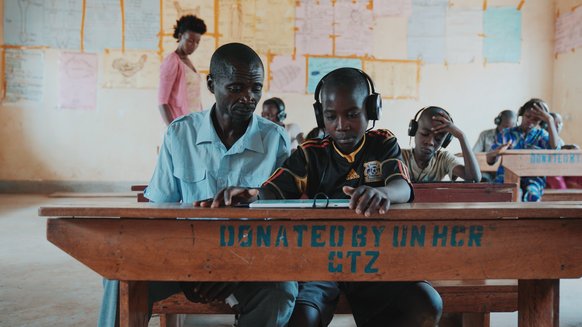Can't Wait To Learn leads to significant academic improvements in literacy and mathmatics in Sudan
A study conducted in Sudan has shown significant improvements in mathematics competency, Arabic literacy competency, and psychological wellbeing of children aged 7–9 (Brown et al., 2020). Qualitative data supported quantitative findings on academic learning outcomes and psychosocial wellbeing, and also found improvements in child behaviour and hygiene.
On Can’t Wait to Learn
Can’t Wait to Learn incorporates best practices and uses gaming technology to deliver high quality, self-paced, contextually appropriate educational content.
In Sudan, Can’t Wait to Learn is called ‘e-learning Sudan’. The programme is delivered in a non-formal classroom setting with children who haven’t had prior access to education, with Sudanese facilitators known as Learning Directors.
Content is educationally comprehensive, based on the national curriculum to ensure clear alignment with the formal system, and is co-created with local artists and children. Can’t Wait to Learn implementation incorporates ministry partnership. The tablets are charged with solar energy.
On the context
Sudan is a lower-middle-income country, with one of the world’s highest out-of-school rates (44%; UNESCO Institute for Statistics 2018), and poor learning outcomes (UNICEF 2020).
The country has experienced almost 60 years of conflict, which has exacerbated infrastructural educational challenges and impacted the education system negatively. Several factors contribute to poor school attendance, retention, and learning outcomes in Sudan, including: poverty; disparities relating to gender, disability and geographical location; and conflict and displacement (UNICEF 2020).
New solutions are urgently required for the current generation of out-of-school children living in Sudan, particularly in remote regions.
Study design
Between December 2017 and December 2018, we conducted a mixed-methods evaluation of Can’t Wait to Learn for Sudanese children who have never attended school.
We conducted the study in eight villages in Sudan - four in Kassala state and four in Sinnar state. Children were eligible if they were aged between seven and nine years old, had never been to school, and spoke Arabic. In each village, around 30 children participated in the study. By the end of the study, 194 children completed the full trial.
Of the villages involved in the trial, half were selected because they already had an existing learning centre for out of school children. The children in these villages received lessons based on the Sudanese state-provided out-of-school learning curriculum. The other villages were selected because they had no existing learning centre, and these villages received Can’t Wait to Learn. Our study compared the outcomes of children who received the out-of-school learning curriculum with the outcomes of children who received the Can’t Wait to Learn programme.
Both programmes were delivered over a six month period. All children received literacy and mathematics lessons for 45 minutes per lesson, five days a week. Participating villages started the lessons at the same time.
Research methods
We evaluated children’s Arabic literacy skills, mathematic skills and psychosocial wellbeing, before and after the learning programmes. This was assessed via standardized assessments conducted by trained research assistants. These assessments were not conducted on tablets: this was to ensure that we did not advantage the Can’t Wait to Learn students due to their increased familiarity with technology after the programme.
We also held interviews with children, caregivers learning directors and supervisors at the end of the programme, to learn more about their experiences and suggestions for change.
The results
On learning:
After the programme, all children’s learning scores improved. However, children who learned via Can’t Wait to Learn scored higher in mathematics and Arabic literacy.
Arabic:
The Arabic assessment contained questions assessing mastery levels for Grades 1–3 competencies, covering core early literacy concepts including print, phonological awareness, vocabulary, listening comprehension, letter naming, sound naming, reading fluency, reading comprehension and writing.
We found a significant intervention effect on Arabic literacy competency. Children in both the comparison and Can’t Wait to Learn villages improved over time after the completion of the programme. However, children in the Can’t Wait to Learn villages improved significantly more - more than 2.5 times as much. Statistically, we saw a large effect size for Can’t Wait to Learn, compared to the comparison programme.
Age, gender, and family income also had an overall impact on literacy scores, but did not impact the effect of the programme:
- Older children scored higher overall than younger children
- Boys scored higher overall than girls
- Children with a higher household income scored higher than children with lower levels of household incomes
Mathematics:
The mathematics assessments consisted of questions assessing mastery levels for Grades 1–3 competencies, covering number recognition, quantity recognition, number and place value, addition and subtraction, multiplication and division, time, and shape. Children in both the comparison and Can’t Wait to Learn villages improved over time: however children in the Can’t Wait to Learn villages improved significantly more in mathematics - almost twice as much. Statistically, we saw a large effect size for Can’t Wait to Learn, compared to the comparison programme.
Age and gender had an overall impact on mathematics scores, but did not impact the effect of the programme:
- Older children scored significantly higher overall than younger children
- Boys scored significantly higher overall than girls
From our interviews, we heard reports that children who received Can’t Wait to Learn improved in their Arabic literacy skills (learning letters, words, verses, writing their name), and mathematics skills (numbers, counting things at home). Children also shared their learning with others at home.
“Before my child did not know counting, how to pay or to bring the change when we send them to the market. But now they know and if you send them to the market, they know to buy and count the change and they know the addition and subtraction.” (Caregiver, Kassala)
Psychosocial wellbeing:
Children’s psychosocial wellbeing was assessed using the Stirling Children’s Wellbeing Scale, which measures child emotional and psychological wellbeing.
Can’t Wait to Learn had a significant impact on children’s psychosocial wellbeing, while no change was observed in children who followed the standard out-of-school curriculum. Qualitative data confirmed this finding. Can’t Wait to Learn improved behaviour in terms of following instructions, and being more polite and respectful.
It was reported that Can’t Wait to Learn improved social connections with other children and families. Learning Directors saw increases in children's confidence and self-esteem, as well as improved self-reliance, including personal hygiene. Learning Directors observed children’s increased motivation to learn and aspirations for further education and careers.
At the beginning of the study, some Learning Directors struggled with classroom management:
“The children were rebellious. They also used obscene words and expressions. This took me a lot of time to handle and fix. Finally, I managed to teach them how to get rid of obscene language and how to deal politely with each other. Little by little they started behaving politely” (Learning Director, Sinnar)
The research suggests that positive classroom environments were a key success of Can’t Wait to Learn. Children enjoyed going to the centre, were enthusiastic, and most interacted well with peers. Facilitators and education stakeholders were positive about the programme and its implementation in Sudan.
“Actually, I like that the idea is innovative, above all, and that it is simple, easy and interesting. When I played myself I found the games very interesting and enjoyable” (Learning Director, Kassala)
Equitable access to quality education
Can't Wait to Learn has been informed by research since its inception - particularly with regard to replication and scale up. The findings from the Sudan study will further progress the programme's international efforts to ensure equitable access to quality education.

